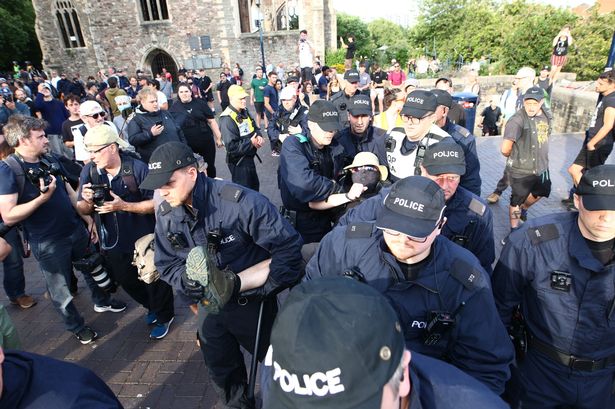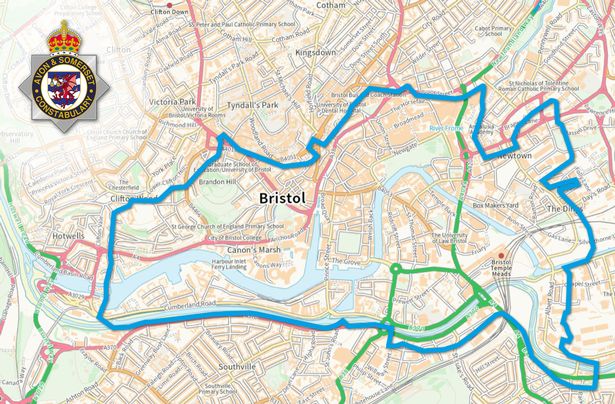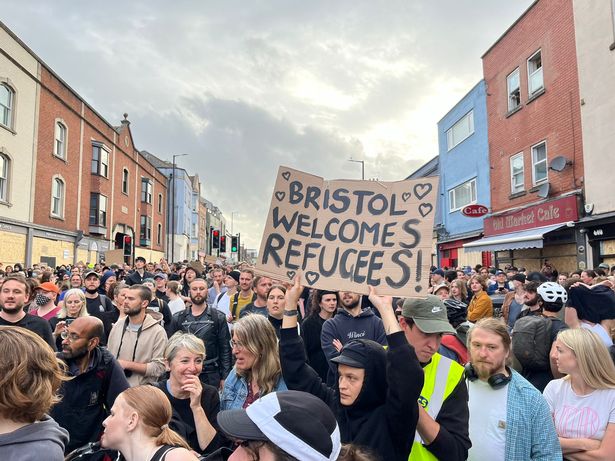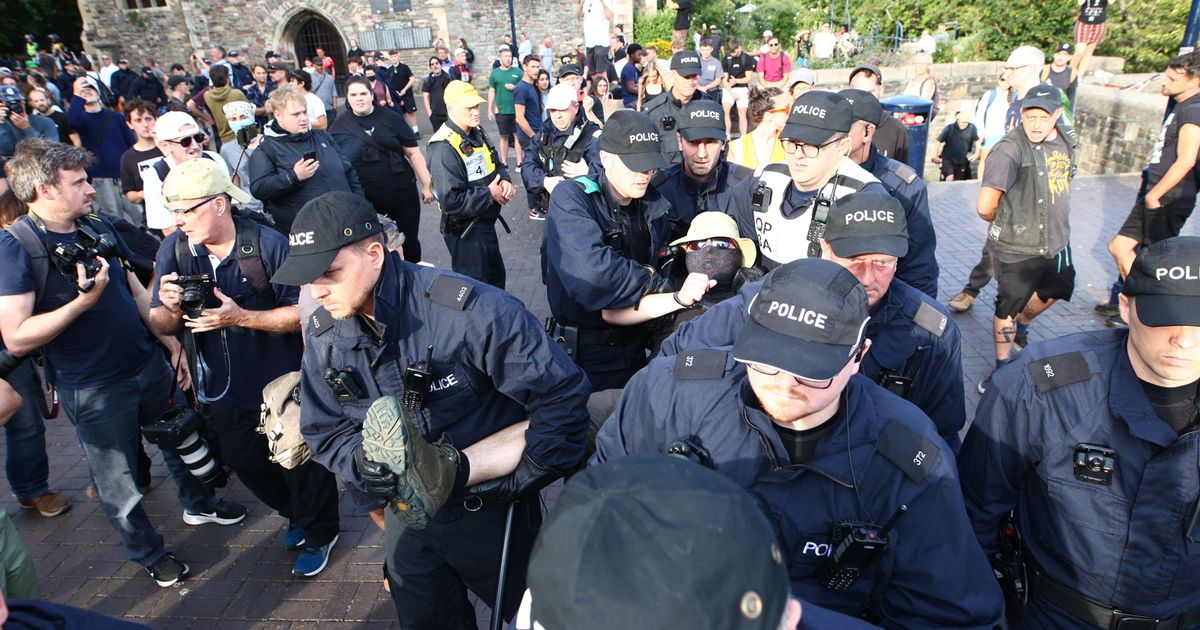The police have also been granted special powers to stop people wearing face coverings Police at the Castle Park protests last August(Image: Tom Wren / SWNS)
Police at the Castle Park protests last August(Image: Tom Wren / SWNS)
Police will declare a dispersal zone in Bristol city centre on Saturday ahead of a demonstration and counter-demonstration outside a hotel. Police chiefs say they have been authorised to use special powers to order people to disperse under the Public Order Act, and will ‘not tolerate any hate crime or disorder’, ahead of the protest.
A hotel on Welsh Back has been listed as part of a national demonstration day by anti-immigration campaigners, but it is unclear how many, if any, will turn up to the location in Bristol. Counter demonstrators from a range of Bristol organisations and campaign groups have pledged to turn out en masse to defend the hotel and challenge any protesters, with police saying they will try to ‘enable a peaceful and lawful’ protest.
The original demonstration is listed on a national Facebook page as starting at 12 noon, while the Bristol Defend Asylum Seekers Campaign are organising a counter-protest to start at 11.30am on Saturday (August 9). A spokesperson for Avon and Somerset police said their special dispersal powers will be in force from 7am on Saturday to 7am on Sunday, and will mean officers have the power to ask people to disperse and arrest them if they won’t.
The powers also give police the right to ask people to remove any face coverings – scarves or balaclavas – in a certain area for those 24 hours. The area covered by the Section 35 dispersal order is large – covering the whole of the city centre from Hotwells and the Harbourside to Castle Park, Broadmead and Temple Meads.
“Our officers will work to enable a peaceful and lawful protest, but we will not tolerate any hate crime or disorder, which will be dealt with robustly,” said a spokesperson for Avon and Somerset police.
 A map showing the extent of Avon and Somerset Police’s Section 60 Dispersal Zone, in place for 24 hours from 7am on Saturday, August 9 and 7am on Sunday August 10(Image: Avon and Somerset police)
A map showing the extent of Avon and Somerset Police’s Section 60 Dispersal Zone, in place for 24 hours from 7am on Saturday, August 9 and 7am on Sunday August 10(Image: Avon and Somerset police)
“It’s important we balance the right to protest with the need to minimise disruption to our communities. Officers have been in regular contact with our partners and stakeholders, including community leaders, this week and we’ve been able to provide reassurance that well-tested and rehearsed policing plans are in place,” she added.
“Enhanced powers have been authorised for areas of central Bristol under section 60AA of the Criminal Justice and Public Order Act. This will be in place from 7am tomorrow (Saturday) through to 7am on Sunday (10 August). A section 60AA power allows officers to ask people to remove face coverings if they have reason to believe it is being worn ‘wholly or mainly’ to conceal their identity,” she said.
READ MORE: Far-right protest updates as violence breaks out in Bristol city centreREAD MORE: Bristol protest LIVE as thousands gather to respond to far-right threat
“A section 35 dispersal zone has also been authorised for the same area which will give officers powers to move on groups or individuals causing – or who are likely to cause – harassment, alarm or distress to others. This will also be in place from 7am tomorrow until 7am on Sunday,” she said.
Last year, there were major disturbances in Castle Park, Baldwin Street and outside a hotel in Redcliffe when a protest by anti-immigration campaigners turned violent. This year, it is unclear whether Saturday’s protest will be on the same scale, or be more of a repeat of what happened a few days later, when thousands of people turned out in Old Market to demonstrate their opposition to the far-right protests.
 Thousands of anti-fascists turn out at “huge, positive rally” in Bristol’s Old Market area(Image: Submitted)
Thousands of anti-fascists turn out at “huge, positive rally” in Bristol’s Old Market area(Image: Submitted)
In the middle is Avon and Somerset’s Neighbourhood Policing Chief Inspector, Serena Serjeant. “We will always seek to enable peaceful and lawful protests but we will not tolerate any form of disorder in our communities,” she said.
“It is important we ensure the safety of both those participating in the protests and the wider public, this is why we have put this operation and these additional powers in place.
“In previous events of this nature, we have seen people sometimes use face coverings to hide their identities in order to commit offences. By pre-authorising these powers, it will allow our officers on the ground the opportunity to engage with those wearing face coverings and ask them to remove them, so we can reduce the risk of criminal offences being committed.
“We’ll continue to proactively engage with our community stakeholders and leaders with messaging which can then be shared among the communities most impacted,” she added.
